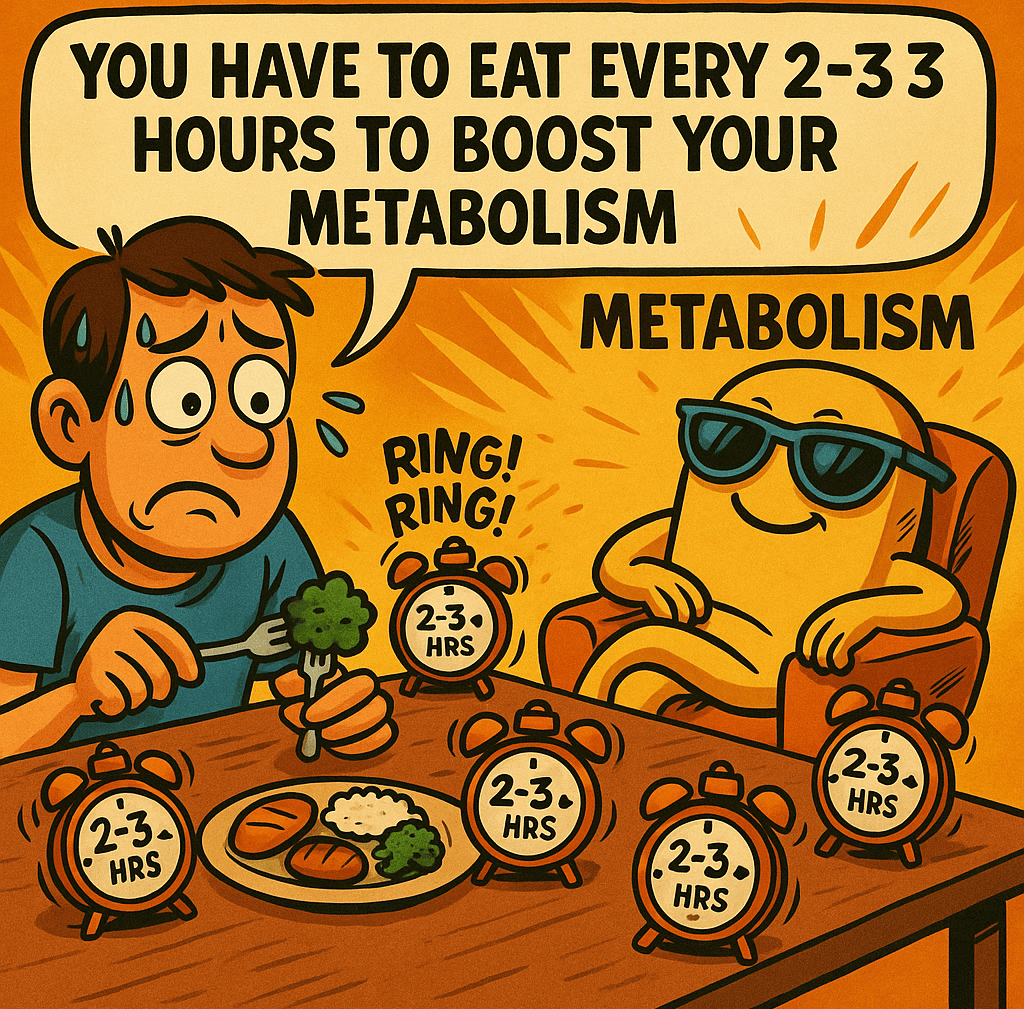Nutrition Myth #6: Eating Every 2–3 Hours Boosts Your Metabolism
Many believe eating frequent meals speeds up metabolism. Learn why total calories matter more, how the thermic effect works, and why meal frequency is personal preference — not science.
NUTRITION
Adi English
3 min read


⏰ Nutrition Myth #6: “You Have to Eat Every 2–3 Hours to Boost Your Metabolism”
📖 Article (~320 words)
Here’s a classic one: the “eat every 2–3 hours or your metabolism will shut down” myth. People honestly believe if you don’t snack like a grazing cow, your body hits the emergency brakes and starts storing fat instantly. If that were true, every office worker who skips lunch would spontaneously turn into a hibernating bear.
Here’s the truth: eating every few hours does not magically speed up your metabolism. What matters is total calories and protein intake across the day. Whether you eat six small meals or three big ones, your body processes energy the same way.
This myth started because of something called the thermic effect of food — the calories your body burns while digesting. Protein especially has a high thermic effect. But here’s the key: it’s based on how much you eat overall, not how often. Eating six 300-calorie meals burns the same digestion energy as eating two 900-calorie meals. Same math, different schedule.
Now, eating every few hours can work for some people. It may help with satiety, prevent extreme hunger, and keep energy levels steady. Athletes might use it to get in enough calories for muscle growth. But for most people, meal frequency is about preference, not metabolism.
Your metabolism doesn’t carry a stopwatch and counts seconds before it switches between different actions. If meal timing boosted metabolism, sumo wrestlers would be running on nuclear energy.
Takeaway: Your metabolism cares about what and how much you eat, not how often. Choose a meal schedule that fits your lifestyle, not a myth.
🗂 Vocabulary
Metabolism – the process your body uses to turn food into energy.
Simple: How your body burns food for energy.
Example: Exercise can speed up your metabolism.
Student example: ____________
Total calories – the full number of calories eaten in a day.
Simple: All the energy from food you eat daily.
Example: Weight loss depends on total calories.
Student example: ____________
Protein – a nutrient that builds and repairs muscles.
Simple: Found in meat, eggs, beans, dairy.
Example: Protein helps with recovery and growth.
Student example: ____________
Thermic effect of food – energy your body burns digesting food.
Simple: Calories used during digestion.
Example: Protein has the highest thermic effect.
Student example: ____________
Satiety – the feeling of being full after eating.
Simple: Not hungry anymore.
Example: Fiber and protein increase satiety.
Student example: ____________
Athlete – someone who trains or competes in sports.
Simple: A person who plays sports.
Example: Athletes need more calories to perform.
Student example: ____________
Meal frequency – how many times per day you eat.
Simple: How often you eat meals daily.
Example: Meal frequency is personal choice.
Student example: ____________
Preference – what you like or choose.
Simple: Personal choice.
Example: Eating three meals a day is my preference.
Student example: ____________
Emergency brakes – a sudden stop or slowdown.
Simple: Something stopping quickly.
Example: People think metabolism hits the emergency brakes when you skip meals.
Student example: ____________
Takeaway – the most important lesson or point.
Simple: The main thing to remember.
Example: The takeaway is that eating often doesn’t boost metabolism.
Student example: ____________
📝 Exercises
Comprehension
What do people wrongly believe about eating every 2–3 hours?
What really determines metabolism and fat gain?
What is the thermic effect of food?
Why might athletes eat frequently?
What is the main takeaway of this article?
Multiple Choice
What is metabolism?
a) A workout plan b) The process of burning food for energy c) A type of protein d) A diet
What matters more than meal frequency?
a) Total calories b) The exact time of meals c) Avoiding carbs d) Skipping breakfast
Which nutrient has the highest thermic effect?
a) Fat b) Protein c) Carbs d) Fiber
Why might frequent meals help some people?
a) Boosts metabolism b) Prevents hunger c) Doubles calories d) Makes food taste better
What does “takeaway” mean here?
a) A restaurant meal b) The main lesson c) A snack d) A delivery order
Fill in the Blank
Metabolism is how the body turns food into ______.
Weight change depends on total ______.
Protein has the highest ______ effect of food.
Eating often may help with ______.
The main ______ is that frequency doesn’t boost metabolism.
True/False
Eating every 2–3 hours speeds up metabolism. (False)
Protein digestion burns more calories than fat or carbs. (True)
Athletes sometimes eat frequently to hit calorie goals. (True)
Meal frequency is the same for everyone. (False)
The article says metabolism has a stopwatch. (False)
Discussion
Do you eat many small meals or a few large ones?
Which style helps you feel more satisfied?
Do you think skipping meals hurts metabolism?
Why do some athletes eat more frequently?
What is your personal takeaway from this article?
